|
|
|
Sort Order |
|
|
|
Items / Page
|
|
|
|
|
|
|
| Srl | Item |
| 1 |
ID:
126581
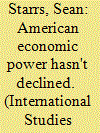

|
|
|
|
|
| Publication |
2013.
|
| Summary/Abstract |
This paper argues that a fundamental failing in the debate on the decline of American economic power is not taking globalization seriously. With the rise of transnational corporations (TNCs), transnational modular production networks, and the globalization of corporate ownership, we can no longer give the same relevance to national accounts such as balance of trade and GDP in the twenty-first century as we did in the mid-twentieth. Rather, we must summon data on the TNCs themselves to encompass their transnational operations. This will reveal, for example, that despite the declining global share of United States GDP from 40% in 1960 to below a quarter from 2008 onward, American corporations continue to dominate sector after sector. In fact, in certain advanced sectors such as aerospace and software-even in financial services-American dominance has increased since 2008. There are no serious contenders, including China. By looking at the wrong data, many have failed to see that American economic power has not declined-it has globalized.
|
|
|
|
|
|
|
|
|
|
|
|
|
|
|
|
| 2 |
ID:
126540


|
|
|
|
|
| Publication |
2013.
|
| Summary/Abstract |
This article reports on an audience costs experiment embedded into a survey of the British public (N = 2235). We extend previous research into audience costs in three main directions. First, we provide clear and direct evidence that they exist for a second-order democratic power, the United Kingdom. Second, we show that the extent of audience costs varies, and at times substantially, along with features of the crisis situation that have not been examined empirically in this context before. In particular, the type of crisis strongly influences public reactions both to bluffing in general and to the wisdom or otherwise of escalating crises before backing down. While audience costs do appear to exist for a UK Prime Minister, he or she cannot inflate them by moving up the escalation chain. Rather, a limited use of force tends to mitigate these costs among the British public because it appears to them a more consistent strategy. Third, we show that public disapproval of a failed bluffing strategy is stronger among the more politically engaged, increasing the likelihood that audience costs will be paid at the ballot box.
|
|
|
|
|
|
|
|
|
|
|
|
|
|
|
|
| 3 |
ID:
126516
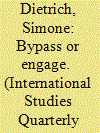

|
|
|
|
|
| Publication |
2013.
|
| Summary/Abstract |
The conventional wisdom in the literature on aid allocation suggests that donors utilize bilateral aid as a tool to buy influence in the aid-receiving country. Those who conclude that aid is driven by donor self-interest focus on government-to-government aid transfers. However, this approach overlooks important variation in delivery tactics: Bilateral donors frequently provide aid to nonstate actors. This paper argues that donors resort to delivery tactics that increase the likelihood of aid achieving its intended outcome. In poorly governed recipient countries, donors bypass recipient governments and deliver more aid through nonstate actors, all else equal. In recipient countries with higher governance quality, donors engage the government and give more aid through the government-to-government channel. Using OLS and Probit regressions, I find empirical support for this argument. Understanding the determinants of donor delivery tactics has important implications for assessing aid effectiveness.
|
|
|
|
|
|
|
|
|
|
|
|
|
|
|
|
| 4 |
ID:
126477
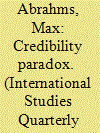

|
|
|
|
|
| Publication |
2013.
|
| Summary/Abstract |
Implicit in the rationalist literature on bargaining over the last half-century is the political utility of violence. Given our anarchical international system populated with egoistic actors, violence is thought to promote concessions by lending credibility to their threats. From the vantage of bargaining theory, then, empirical research on terrorism poses a puzzle. For nonstate actors, terrorism signals a credible threat in comparison with less extreme tactical alternatives. In recent years, however, a spate of studies across disciplines and methodologies has nonetheless found that neither escalating to terrorism nor with terrorism encourages government concessions. In fact, perpetrating terrorist acts reportedly lowers the likelihood of government compliance, particularly as the civilian casualties rise. The apparent tendency for this extreme form of violence to impede concessions challenges the external validity of bargaining theory, as traditionally understood. In this study, I propose and test an important psychological refinement to the standard rationalist narrative. Via an experiment on a national sample of adults, I find evidence of a newfound cognitive heuristic undermining the coercive logic of escalation enshrined in bargaining theory. Due to this oversight, mainstream bargaining theory overestimates the political utility of violence, particularly as an instrument of coercion.
|
|
|
|
|
|
|
|
|
|
|
|
|
|
|
|
| 5 |
ID:
126548


|
|
|
|
|
| Publication |
2013.
|
| Summary/Abstract |
Political scientists have examined how domestic politics and the competition for international capital affect the setting of national tax rates. In this paper, I explore how political institutions, specifically the level of democracy, affect firm-level taxation across the world. I argue that electoral competition leads democratic governments to higher levels of taxation of firms. Using a data set on firm tax payments on the foreign affiliates of US multinational corporations from the US Bureau of Economic Analysis, I show that there are large variations within countries on the tax burdens faced by firms that are not explained by national tax rates. I find evidence that the mobility of the specific investment project, the types of spillovers these investments provide to a community, and attributes of the parent firm are all important determinants of taxation. While firm-level factors clearly affect corporate taxation, I argue that democratic institutions limit the offering of tax incentives and generate electoral benefits to policing tax avoidance by multinational corporations. After controlling for parent firm and foreign affiliate-level factors, I find that democratic countries generate as much as 26% more tax revenues from multinational corporations relative to authoritarian countries.
|
|
|
|
|
|
|
|
|
|
|
|
|
|
|
|
| 6 |
ID:
126580


|
|
|
|
|
| Publication |
2013.
|
| Summary/Abstract |
Who do citizens blame for the recent European economic crisis? In this paper, we test theories about blame attribution with respect to the economic crisis. We argue that blame for the crisis is partially conditioned by partisan bias and framings of the crisis as being related to globalization. We test the argument with new survey data and a survey experiment from Spain. In the experiment, respondents receive different framings of the economic crisis which are endorsed by different political parties and non-partisan organizations. We obtain the following findings: (i) blame for who is responsible for the economic crisis is greatly affected by partisanship; (ii) making globalization as a cause of the crisis salient exonerates the government of blame, but only for co-partisans of the government; and (iii) citizens are willing to blame other globalization-related factors for the crisis, in particular, European governments and blame the domestic government less. The results expand our understanding of public opinion dynamics during major economic recessions and also suggest conditions under which "scapegoating" globalization can occur.
|
|
|
|
|
|
|
|
|
|
|
|
|
|
|
|
| 7 |
ID:
126565
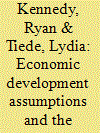

|
|
|
|
|
| Publication |
2013.
|
| Summary/Abstract |
Scholars have argued that oil resources lead to poor quality institutions and governance, which causes slower economic growth, an increased propensity for civil war, and other maladies. Such conclusions, however, rest on strong modernization assumptions that oil resources are unrelated or detrimental to the level of economic development. Utilizing a unique multilevel version of extreme bounds analysis (EBA), we find that oil's deleterious effects on governance are not well established. Instead, when we relax strong assumptions about the exogeneity of economic development and utilize more objective indicators of institutional quality, oil has a net positive impact on governance. Moreover, when accounting for endogeneity, there is little to suggest either an intervening or independent effect of poor governance on civil conflict in petro-states.
|
|
|
|
|
|
|
|
|
|
|
|
|
|
|
|
| 8 |
ID:
126582
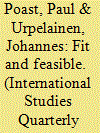

|
|
|
|
|
| Publication |
2013.
|
| Summary/Abstract |
Does democratization make states join existing international organizations (IOs)? Previous research suggests that democratization increases a state's propensity to join IOs capable of assisting in the distribution of public goods and establishing credibility for domestic reforms. We argue that this is not the case. Instead, recent democratization has a strong effect on a state's propensity to form new IOs. Since democratizing states face different governance problems than established democracies, existing IOs may not be a good "fit." Additionally, established democracies might hesitate to allow democratizing states membership in the most lucrative existing IOs, thereby making immediate accession to such IOs not "feasible." Quantitative analysis shows that democratization has a strong and consistently positive effect on the probability of forming a new IO, but not on the probability of joining an existing IO. The findings suggest that international cooperation theorists should begin to analyze forming new and joining existing IOs as alternative strategies that states can use to achieve their policy goals.
|
|
|
|
|
|
|
|
|
|
|
|
|
|
|
|
| 9 |
ID:
126520
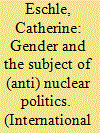

|
|
|
|
|
| Publication |
2013.
|
| Summary/Abstract |
This article aims to rehabilitate women campaigners against nuclear weapons as a focus of study and interlocutor for feminist International Relations scholars. Highlighting the recent tendency in gender and security studies to ignore or stereotype these campaigners, I first show how their critical re-investigation has been facilitated by recent systematizations of poststructuralist-influenced feminist methodology. In this light, I then revisit the discourses circulating in women's antinuclear activism in the 1980s before deconstructing in more detail the post-Cold War writings of Helen Caldicott and Angie Zelter. I argue that multiple, differently gendered constructions of the antinuclear campaigner were in play during the Cold War and have since been reconfigured in ways that reflect and reproduce the shift to a post-Cold War context and differences between the United States and UK. In such ways, then, women antinuclear campaigners continue to develop diverse oppositional subject positions in their efforts to challenge nuclear hegemony, in a discursive struggle worthy of attention from gender and security scholars as part of a broader, critical re-engagement with the gendered dimensions of nuclear politics.
|
|
|
|
|
|
|
|
|
|
|
|
|
|
|
|
| 10 |
ID:
126506
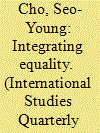

|
|
|
|
|
| Publication |
2013.
|
| Summary/Abstract |
This paper empirically investigates whether globalization can improve women's rights. Using panel data from 150 countries over the 1981-2008 period, I find that social globalization positively affects women's economic and social rights. When controlling for social globalization, however, economic globalization does not have any effect on women's rights. Despite the positive effect of (social) globalization on women's standing in a country, (marginalized) foreign women, proxied with inflows of human trafficking, are not beneficiaries of such "female-friendly" globalization effects.
|
|
|
|
|
|
|
|
|
|
|
|
|
|
|
|
| 11 |
ID:
126583
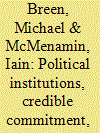

|
|
|
|
|
| Publication |
2013.
|
| Summary/Abstract |
This article tests systematically the effect of political structures on the credibility of sovereign debtors in advanced economies. It argues that power-sharing and party system polarization have important effects on long-term interest rates. Where collective responsibility is high and polarization is low, the market perceives a more credible commitment on the part of sovereign debtors. These arguments derived from the theory of credible commitments perform much better than alternative accounts of the politics of sovereign debt, namely a market preference for right-wing governments and more flexible polities. The principal data consist of a panel of 23 rich countries between 1970 and 2009. There are tests for robustness to a wider sample and a variety of different measurements.
|
|
|
|
|
|
|
|
|
|
|
|
|
|
|
|
| 12 |
ID:
126541


|
|
|
|
|
| Publication |
2013.
|
| Summary/Abstract |
Many have noted the rise of the global in academic and popular discourse. We ask how this global frame of reference has been incorporated into secondary social science textbooks, a realm traditionally dominated by nationalist discourse. Utilizing a data set from more than 500 secondary school textbooks from around the world, spanning 1970-2008, we describe the incorporation of mentions of globalization and global citizenship into textbooks over time and then use a multilevel model to determine the textbook and country-level variables associated with mentions of each. We find that globalization and global citizenship are both predicted by the textbook content's reflection of the external world, including international events and mentions of human rights. However, no cross-national economic or political differences systematically predict incorporation of these topics. We argue that mentions of globalization and global citizenship in textbooks are two manifestations of a world culture that increasingly emphasizes interconnectedness in postnational society
|
|
|
|
|
|
|
|
|
|
|
|
|
|
|
|
| 13 |
ID:
126571
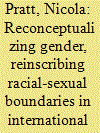

|
|
|
|
|
| Publication |
2013.
|
| Summary/Abstract |
The gendered boundaries of international security, historically identified by feminist scholarship, are being broken down since the passage of UN Security Council Resolution 1325, which calls on member states to mainstream a gender perspective into matters of conflict and peacebuilding. However, we should not read this as a positive step toward the transformation of the lives of women (and men) in conflict zones. Reading 1325 and subsequent resolutions through a postcolonial feminist lens reveals that this reconceptualization of gender occurs through a reinscription of racial-sexual boundaries, evocative of the political economy of imperialism. An examination of the discourses and practices of the "war on terror" exposes a similar configuration of gender, race, and sexuality. I argue that 1325 works in tandem with dominant security practices and discourses in the post-9/11 moment, normalizing the violence of counterterrorism and counterinsurgency measures. Understanding the significance of race and sexuality in the conceptualization of gender has implications for transnational feminist praxis and its ability to construct a counter-hegemonic project to transform the dominant structures of power that give rise to war, conflict, insecurity, and injustice.
|
|
|
|
|
|
|
|
|
|
|
|
|
|
|
|
| 14 |
ID:
126579
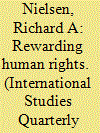

|
|
|
|
|
| Publication |
2013.
|
| Summary/Abstract |
This article provides theoretical and empirical solutions to two connected puzzles in the study of foreign aid and human rights: Do foreign aid donors use aid sanctions to punish repressive states, and if so, why? I show that donors impose aid sanctions selectively. Aid sanctions typically occur when repressive states do not have close political ties to aid donors, when violations have negative consequences for donors and when violations are widely publicized. Using a data set of bilateral foreign aid to 118 developing countries between 1981 and 2004, I find that variation in these factors largely accounts for the differing aid sanctions that result from objectively similar rights violations by the governments of developing countries.
|
|
|
|
|
|
|
|
|
|
|
|
|
|
|
|
| 15 |
ID:
126491
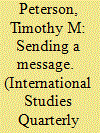

|
|
|
|
|
| Publication |
2013.
|
| Summary/Abstract |
Studies often assume that empty sanction threats inflict reputation costs on senders. However, target response to senders' previous decisions whether to back down or impose sanctions remains unexamined. In this paper, I argue that the target of sanction threats looks to the sender's actions against prior resistant targets. When the sender has backed down recently, the target, inferring that the sender is prone to making empty threats, is less likely to acquiesce. Conversely, when the sender has recently imposed sanctions against a resistant target, the current target infers that sanction imposition is likely to follow resistance, and therefore, it is more likely to acquiesce, all else equal. In statistical tests of US sanction threats spanning 1971-2000, I find strong evidence that the target is less likely to acquiesce when the United States recently backed down from a sanction threat. I find somewhat weaker evidence that the target is more likely to acquiesce when the United States recently imposed sanctions.
|
|
|
|
|
|
|
|
|
|
|
|
|
|
|
|
| 16 |
ID:
126577


|
|
|
|
|
| Publication |
2013.
|
| Summary/Abstract |
This study argues that a central factor in the determinants of citizen attitudes toward trade is the social psychology of the individual in question. Namely, we contend that the level of social trust an individual has will condition the degree to which an individual wants to open her country to imports from other countries. Those individuals with lower relative levels of social trust are less likely to support the notion of freer trade. We base this contention on the logic that those people who are distrustful of people in general are more likely to distrust that which comes from people who are unknown to them, such as goods coming into their country from abroad. This argument is a departure from previous studies of public attitudes toward trade, which have focused on various economic utilitarian considerations and xenophobia that shape citizen attitudes toward trade liberalization. To test our argument, we employ data from the 1995-1997 wave of the World Values Survey. Using a logit regression analysis, we find, as predicted, that the more social trust an individual has, the more likely that person is to support the idea of liberalized trade.
|
|
|
|
|
|
|
|
|
|
|
|
|
|
|
|
| 17 |
ID:
126471


|
|
|
|
|
| Publication |
2013.
|
| Summary/Abstract |
International relations scholars have previously argued that states facing budget constraints will join alliances to free resources for domestic spending. In this paper, we focus on the primary mechanism by which leaders have relaxed this constraint: sovereign borrowing. Sovereign debt enables states to maintain stable tax rates while increasing expenditures to confront budgetary emergencies. Affordable access to credit, then, serves as both a source of power and an important buffer between security and the political consequences of fiscal policy. States that lack the confidence of investors must make tough choices between continued security and their electoral fortunes. We suggest that as governments lack access to affordable credit, they will substitute military capacity with alliance formation. Alliances provide a means for leaders to offset the loss of flexibility from diminished access to credit without disturbing the domestic political economy. Using previous models of alliance formation as a guide, our empirical evidence indicates that states that have a hard time borrowing are more likely to form an alliance than those states with affordable access to credit markets.
|
|
|
|
|
|
|
|
|
|
|
|
|
|
|
|
|
|
|
|
|